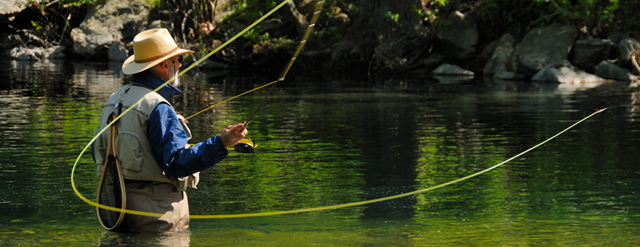Practice for Perfection
Instruction By Thomas R. Dempsey, M.D. CCI

Practice is a word that congers up comments such as “That’s so boring, What’s the point?, I really don’t have time,” or better,”I don’t need to practice”. Well, all these are true to a certain extent but if we use them as an excuse to justify our fishing sob stories then we have no one to blame but ourselves. I get calls all the time that go something like this “I’m going to Montana next week and I need a lesson to brush up on my casting”. When was the last time you threw a fly? Maybe LAST year in Montana. Thousands of dollars are spent on destination fly fishing trips to Alaska but precious little time is set aside to practice casting. You think LeBron or Tiger would hit the court or the links without practicing, never.
Practice is boring.
It doesn’t have to be. Always practice with a goal. Look for ways to make it “fun”. Having a practice partner is a great way to combine practice with camaraderie. Your partner can help you correct your mistakes. Nothing better than another set of eyes from a different angle. You can set up targets and have a friendly competition, all while improving your accuracy. Lay out ropes and practice picking up and laying down your cast. This will improve your tracking. Using a hoola hoop attached up right to a pole presents a perfect target to help hone and tighten your loops. Before tarpon season every year I practice casting into a child’s inner tube floating on the water and tethered with a 6 ounce weight dangling off the side. This give me the chance to cast to a the inside of the inner tube—the ‘strike zone’—while the current and wind move the ‘fish’ along.
The point of practice is to keep your skills sharp and to improve.
Always practice the things you do well, not just the things you need work on. There is a carry over from the skills we are able to knock out easily to the one that give us trouble. Some people call this ‘muscle memory’, I think it all comes from your computer, repetition promotes perfection. Like that? The more you practice the easier it becomes to put that fly on target and hit that tailing red fish at 80 feet. I once heard someone say, “I don’t need to cast 80 feet,” I say, “You don’t need to because you CAN’T!” Don ‘t cut yourself short, you just might need that distance cast at some point.
Casting on a regular basis is much more productive than cramming at the last minute.
Retention is better when practice sessions are compact and short. Practicing 15 to 30 minutes a day is ideal, but DO cast at least three times a week. This is a small price to pay for the sport you love. Keeping a rod rigged and ready makes preparation painless and seeing that rod at the ready kind of gooses one along to get with it. I try and outline a program to go by during my practice sessions. Start off with some warm-up casting strokes, and then proceed to the focus of the session. Accuracy, distance, mends, roll cast, make a list and keep a little diary of what you want to accomplish during your practice periods, and write down what you do.
There are a number of ways to establish a good practice routine. First, I would recommend hooking up with a certified casting instructor to identify your strengths and weaknesses. Your practice should be geared to your personal style and goals. Then you can set up your sessions to be general tune-ups or target a specific goal. An angler going tarpon fishing for the first time will find the time he spent learning to throw heavy flies with an 11wt. rod was well worth it when he gets on the deck of a skiff in south Florida. Your casting instructor can direct you to DVDs and Internet sites where you can harvest a wealth of information that can help you practice. There are numerous books available and I bet your instructor has probably read most of them.
Finally.practice should incorporate the 4 Ps.
1. Preparation -Practice with the gear you intend to fish with.
2. Pointed – Have a specific goal every time you go out to practice.
3. Productive -Build on your practice routines.Reach your goals.
4. Pleasant – Make your practice fun and you’ll keep coming back.
Thomas Dempsey certified casting instructor Mobile, Alabama.
